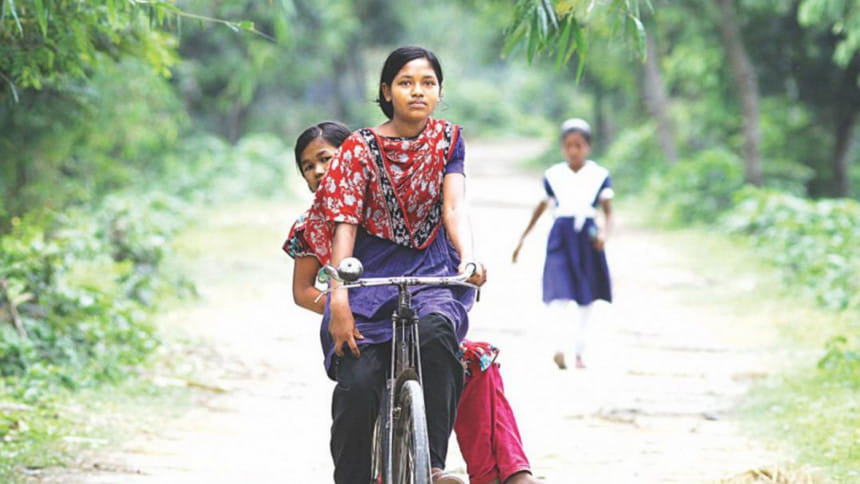We cannot fail the world’s children

The world is confronting an unprecedented education crisis. At the height of school closures due to the coronavirus pandemic, more than 1.3 billion children were forced out of their classrooms. As many as 16 million children in the world's most vulnerable countries may never return to school, forced to take on work to help their families survive the brutal economic impacts of this deadly disease.
Before the pandemic, the world had already been struggling to provide all children with a quality education. Nine out of ten school children in low-income countries were still unable to read a story by the age of ten. Due to the pandemic and the long period out of school, these children's education has been further disrupted.
In Bangladesh, the drop-out rates in primary schools of around 18 percent and in secondary schools of around 35 percent are likely to double as children and families cope with school closures and loss of income. The most disadvantaged children such as those with disabilities and those from socioeconomically disadvantaged families are at risk of dropping out permanently. Girls are at greater risk—vulnerable to higher levels of sexual exploitation and child marriage once they drop out of school.
Missing out on education does long-term damage to individuals, communities and nations. As a result of this crisis, a generation of girls who should be among the ranks of future entrepreneurs, scientists, engineers, teachers, doctors and world leaders may be left dreaming of what they might otherwise have become.
Education is a human right—part of the UN Convention on the Rights of the Child. Generations of well-educated young people are essential to the stability and prosperity of nations, open societies and democracies, poverty reduction, greater gender equality, and improved health and nutrition.
Education, particularly girls' education, is catalytic and one of the best tools to advance development, strengthen economies, and reduce intergenerational poverty. By educating girls today we can genuinely change the world of tomorrow. For every additional year a girl stays in secondary school, she can increase her future earnings by up to 20 percent. Access to 12 years of good quality education for girls improves their chances of finding a job, avoiding child marriage, and choosing when and how many children to have.
The UK is a global champion of girls' education and keen to work in partnership with Bangladesh to ensure those 12 years of education are made available to all, both boys and girls.
Over the last five years, the UK has worked through local partners to provide nearly 1.9 million children, including 1 million girls, with a decent education in Bangladesh. We have also supported 125,000 young children, of whom 50 percent are girls, to receive technical and vocational skills training followed by job placement and self-employment opportunities.
Urgent global action and international investment are now desperately needed to help achieve every girl's right to 12 years of quality education, recover from the impact of the pandemic, and stop a lost generation of children from never returning to school.
This is where the Global Partnership for Education (GPE) is so important. The GPE has the vision, the ability and the strength to get things done. An investment that transforms lives through the power of education. Since 2002, the GPE has contributed to getting 160 million more children in school and doubling girls' enrolment in the countries they work in.
In Bangladesh, the GPE will allocate USD 53.9 million and USD 15 million for the government of Bangladesh to expand access to quality pre-primary and primary education and mitigate the impacts of Covid-19. A further USD 10.78 million will support education for Rohingya refugee and Bangladeshi children in Cox's Bazar.
In 2021, the year of the UK's G7 presidency, the UK and Kenya will co-host a landmark global education summit. The summit will push for concrete action to get children into school and raise vital funding for the GPE. Prime Minister Boris Johnson has been clear that girls' education is a top UK priority. We are stepping up our efforts and we need other countries to join us.
Over the next five years, the GPE needs at least USD 5 billion to transform education systems in up to 87 developing countries. This will give 175 million children the opportunity to receive quality education. Achieving this will be a challenge for the world. But let us not forget that behind each of these statistics is a child who looks to education as the path to a better future.
Through the GPE, we will direct investment and action to where they are needed most. Together, governments, businesses and individuals can and must invest in children's futures. Like boys, girls deserve an education, and we cannot let them down. Our ask is simple: Step forward and fund their education.
We can only achieve the future we and they want by investing in the generation that will build it.
Judith Herbertson is Development Director, Foreign, Commonwealth and Development Office, British High Commission, Dhaka.

 For all latest news, follow The Daily Star's Google News channel.
For all latest news, follow The Daily Star's Google News channel. 



Comments